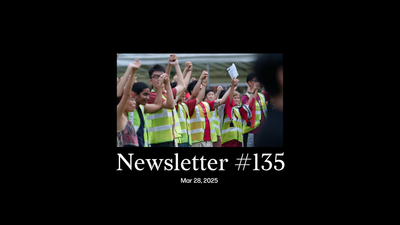Dear reader,
Thanks to those of you who showed up last weekend for our print launch at the Ethos Festive Market! It was great chatting with you, while being able to hold a physical copy of Jom. Hopefully it’s the first of many.
For those who ordered your copy before December 4th, our cut-off date for Christmas, it should have reached you by now. (Please reply to this e-mail to let us know if it hasn’t.) For orders placed after that, you’ll get yours by mid-January. Apologies for not matching typical Singapore-style e-commerce efficiency, but the Jom team is slowly easing into our well-deserved break.
Much thanks to the Jomrades who sacrificed an afternoon last week to pack, with great care, the over 200 copies shipped out already. From the festive market set-up to the old-school SingPost deliveries of our print copies, I was reminded last week that we’re just a start-up—sometimes we all roll up our sleeves and do whatever has to be done. It’s cool to see the ease with which my colleagues flip from intellectual to physical and (also) emotional labour.
But in that blur, we sometimes make mistakes. We’d like to apologise to Peiying Loh, co-founder of Kontinentalist, for missing out her name among our editorial contributors in our print issue. We agonised over this when we found out, especially since Peiying was one of the key architects of the Konti x Jom collaboration in our housing section: a depiction of “The Singapore Dream” through a mix of a choropleth map, infographics and charts. It sucks not to be credited. We appreciate her grace and understanding in the matter, and hope that you, too, remember her when you unfold the gorgeous map.
Our essay of the week, “Harm in schools”, by Charmaine Poh, my co-founder, is about bullying, harassment, and other sources of harm that young people have to sometimes contend with. It looks at how the system might be failing both victims and perpetrators, with, for instance, insufficient attention paid to understanding the roots of the offenders’ angst. These are not issues that we in Singapore, given the country’s stellar educational reputation, are comfortable talking about.
The essay is a long labour of love, months in the making, conceived when two people reached out to Jom through our friends at AWARE, with their stories of girls being abused in schools. I was a little surprised that they’d consider us given how new we are, but it made me realise that there aren’t many clear paths of recourse for victims and their parents or guardians. They didn’t intend it as an exposé. Neither the individuals nor the schools are named. They simply wanted their stories out.
Over the subsequent months Charmaine and Jin Hee Lee, a researcher, interviewed 13 counsellors, consultants, students, parents, and teachers. These interviews helped develop the piece into a broader story about how we, as a society, deal with harm in schools. There’s no doubt that we’ve made much progress over the years, whether in terms of offering counselling in schools, or trying to overcome wider societal taboos over mental health discussions. Yet it’s equally clear, that, as Charmaine writes:
“...considering the potential consequences of harm in schools, Singapore has a long way to go. This broad examination seems to point to the need for a more open, transparent, and restorative culture; one that validates how young people are feeling and thinking, and pulls no stops when asked for help.”
I like the way Charmaine centres the stories of the survivors while showering empathy on the people around them, especially their teachers, who are often overworked and lack the training and toolkits to handle novel situations in the classroom. Given that youth suicides reached a high of 125 last year, it’s an urgent situation that requires our collective effort to address. It takes a village…and you can start by reading the essay.
In Singapore This Week, our weekly digest, we discuss Singapore’s love of Henry Kissinger, loneliness among the elderly, the rise of HIV cases, this year’s three Cultural Medallion winners, and TikTok’s desire to invest in Tokopedia as a means to expand its e-commerce offering.
That’s it for our second last issue of the year! In the final one next week, Jom’s editors leave you with their favourite books and movies of the year.
Jom baca dan tonton,
Sudhir Vadaketh
Editor-in-chief, Jom
If you've enjoyed our newsletters, please scroll to the bottom of this page to sign up to receive them direct in your inbox.






